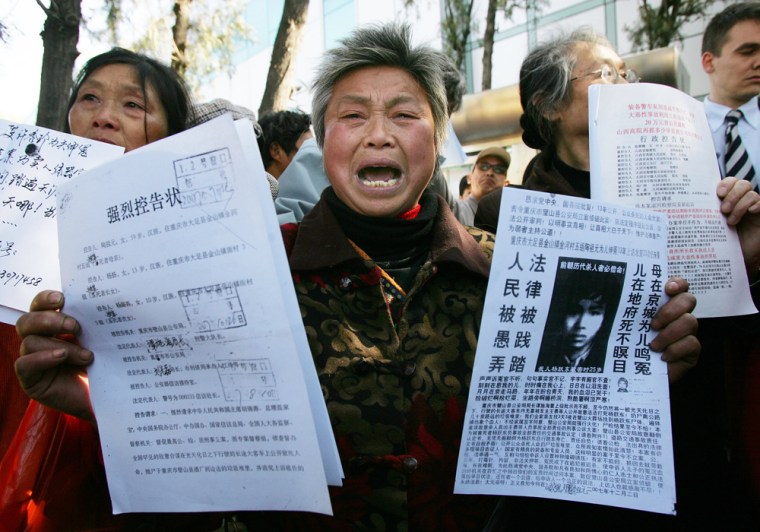The athletes are like pretty kites flying overhead, so mesmerizing that they distract from the grimmer realities of the Beijing Games, just as the Chinese government hoped they would. But don't forget the "other" China. As a reminder, consider the name Hu Jia. There are actually two famous Hu Jias in this country, one a renowned gold medalist in diving, and the other a jailed dissident. Between them, they tell the full story of these Olympics.
The apartment of the dissident Hu Jia is in a neighborhood called Freedom City, not far from the Olympic Park, or rather it was, before he was thrown into a labor camp and his wife, Zeng Jinyan, a prominent activist, disappeared from Beijing just before the Games began.
The diver Hu Jia, who triumphed in Athens four years ago, is not here either, because at the age of 25, after years of hitting the water for six hours a day in the pitiless national program, he has retina injuries that prevented him from going for the "enormous glory" of a gold in Beijing. "I will do my utmost to grab one, unless my eyes are really blind," he told the state media before he was forced to bow out.
It's easy for the head duckers of the International Olympic Committee to separate themselves from the underlying issues of the Beijing Games by labeling them "apolitical." But the Greek word "polis" means an affair of the state, and the Beijing Games clearly qualify as one, from their $40 billion governmental price tag, to the bulldozing of thousands of lives to make way for the stadiums, to a seven-year crackdown on social activists by the hosts, which is still going on.
On Wednesday, this purported superpower sentenced a couple of old women, aged 77 and 79, to a year of labor reeducation because they filed for a permit to protest eviction from their homes at one of the supposedly "official" Olympic demonstration sites. This is just one of the brazen evils perpetrated here in the name of "apolitical" sport. China also retains its title as the world's leader in jailing journalists. If the IOC wanted an Olympics separate from Chinese politics, it should have staged them in Tahiti.
The Chinese government has counted on sparkling pyrotechnics, anthems and a happy motto — "One World, One Dream" — to obscure the real price of the Games. But it's obvious in the state's fixation on gold medals that the Olympics are a deadly win-at-all-costs national project. Just as Beijing has been beautified with landscaping and postered walls that conceal poorer neighborhoods, the glitter of gold seems to be interpreted as evidence of both prowess and progress.
China has engaged in state-sponsored cheating — apparently forging the birth dates of underage female gymnasts — and driven its athletes like an aggressive stage parent. Other nations do this, too, and no one will ever equal the Soviets or East Germans for federally funded cheating. But there is a special patriotic urgency to winning here that's unmistakable. Mere participation in the Games is not enough, and neither is silver or bronze, which are causes for shame. Some athletes have said that anything less than a gold medal will render all their previous accomplishments meaningless.
The diver Hu Jia, the son of workers from Wuhan in the Hubei province in central China, has barely seen his parents since he entered the national program at the age of 9, like most of the country's prodigies. In Athens he was a marvel on the 10-meter platform, defeating his countryman Tian Liang with a series of helix-like dives that earned nine perfect scores of 10.
But a year later, Hu underwent surgery for a detached retina, and has been plagued with eye and shoulder problems ever since. According to the New York Times, a study has shown that 24 percent of Chinese divers have retina damage, probably a result of the intensity with which they practice, and the repetitive impact with the water.
Hu's father was quoted in the Chinese media as saying that had he known his son might work himself blind on the national team, "I would never have sent him off to dive." Still, Hu was apparently insistent that the risk to his eyes was worth the attempt to make the team in Beijing.
"I kept hoping to the bitter end and finally had to see that it was hopeless," he was quoted as saying to a Chinese media outlet.
On the opposite end of the patriotic spectrum is activist Hu Jia, long a heroic advocate for the disenfranchised. Hu has worked for government accountability on everything from the Olympics to AIDS. He was instrumental in helping to publicize the HIV epidemic in the rural province of Henan, detailed in the riveting book "China Road" by NPR correspondent Rob Gifford. About 300,000 people in Henan contracted HIV as the result of a bureaucratic plasma-selling scheme in the 1990s.
Hu is spending 3 1/2 years in a labor camp for insisting that China keep the human rights promises it made in bidding for the Olympics. He dared to try to hold the Beijing Organizing Committee at its word when it declared that the Chinese state would use the Games to "enhance all social conditions, including education, health and human rights."
Among other things, Hu signed a petition stating, "We want human rights, not the Olympics." This spring, he was put on trial at Beijing's Number One Intermediate People's Court for subversion. No observers or reporters were allowed to attend. After he was sentenced, his mother described what had happened in the courtroom. Her summary should stand as the alternative motto of the Beijing Games.
"He was found guilty of speaking his mind," she said.
